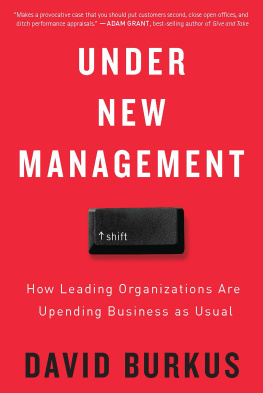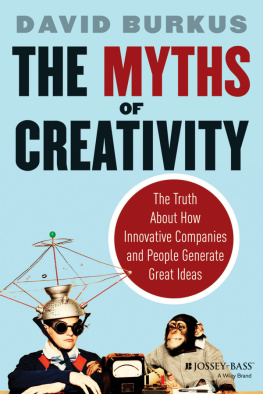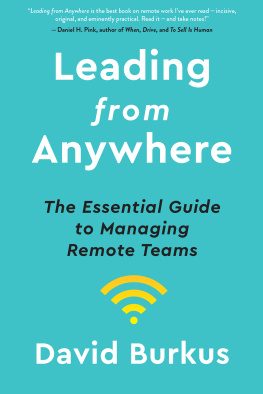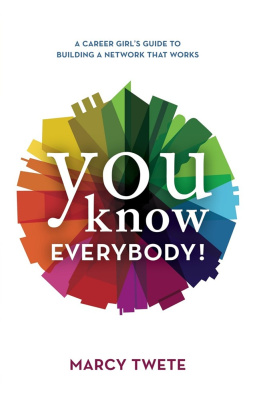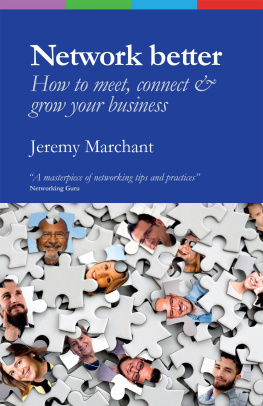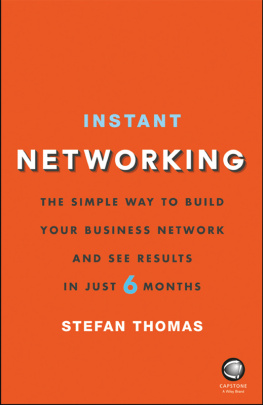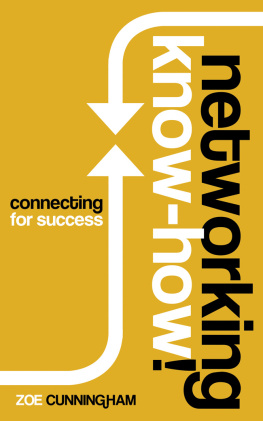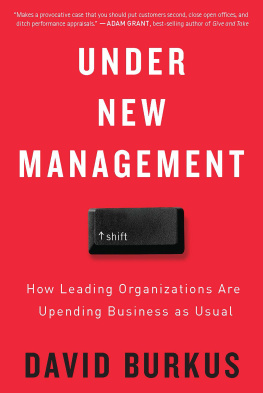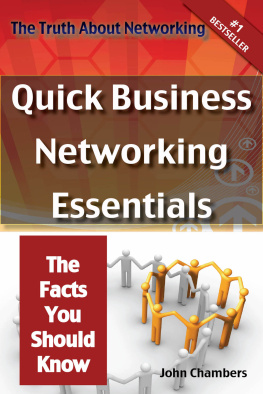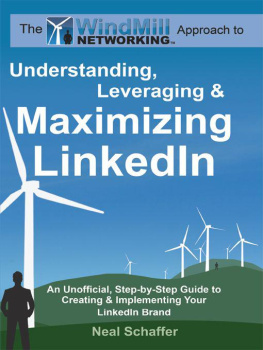Copyright 2018 by David Burkus
All rights reserved
For information about permission to reproduce selections from this book, write to or to Permissions, Houghton Mifflin Harcourt Publishing Company, 3 Park Avenue, 19th Floor, New York, New York 10016.
hmhco.com
Library of Congress Cataloging-in-Publication Data
Names: Burkus, David, (date) author.
Title: Friend of a friend... : understanding the hidden networks that can transform your life and your career / David Burkus.
Description: Boston : Houghton Mifflin Harcourt, 2018. | Includes bibliographical references and index.
Identifiers: LCCN 2017056986 (print) | LCCN 2017045593 (ebook) | ISBN 9780544971288 (ebook) | ISBN 9780544971264 (hardback)
Subjects: LCSH : Business networks. | BISAC: BUSINESS & ECONOMICS / Careers / General. Classification: LCC HD 69. S 8 (print) | LCC HD 69. S 8 B 8587 2018 (ebook) | DDC 650.1/3dc23
LC record available at https://lccn.loc.gov/2017056986
Cover design by Timothy Goodman
Author photograph Daniel Folkers
v1.0418
To my parents
Introduction
Or
How I Learned to Stop Networking and Love Network Science
I N 1999, A YOUNG COMPUTER ENGINEER and aspiring entrepreneur named Adam Rifkin was looking for advice on his next move. In gathering advice, Rifkin sent an unsolicited email to a man he had never met in person named Graham Spencer. At the time, Spencer was one of the hottest names in the Silicon Valley tech community, having just completed the sale of his last start-up,
Although Excite.com is still active, its easy to forgive anyone who doesnt immediately recognize the name. In the age before Google and Facebook, however, Excite was one of the biggest brands on the Internet. Started in 1993 by Spencer and five of his friends, Excite had grown to become the front page of the Internet for a significant percentage of web-surfers. (This was back when people still used that term seriously.) Spencer and the Excite team had grown the website from a humble start-up to a vast collection of websites. They had some financial struggles, but the success of the website in drawing users eventually led them to a major payout. In early 1999, Excite was sold to the telecommunications company @Home for $6.7 billion. Needless to say, once the deal was finalized, Spencer was getting a lot of attention.
That Rifkin sent a cold email hoping for some advice from a Silicon Valley success story isnt unusual; who wouldnt at least try? What is unusual is that Spencer agreed to the request. Not only did Spencer volunteer to meet with Rifkin in person and answer any questions Rifkin had, but he went above and beyond that. Once Rifkin had explained his idea, Spencer connected Rifkin to a venture capitalist who became one of the first funders of the new start-up.
The overriding question is why, at the height of his popularity, and at the peak of the demand for his time, did Spencer agree to sit down with someone he had never met in person?
Because five years earlier, Rifkin and Spencer had built a webpage about punk rock bands.
More specifically, in 1994, as Rifkin was beginning his studies in computer science, he built a fan website dedicated to the emerging punk rock band Green Day. Despite it being the early days of the Internet, the website took off quickly. In fact, the website was getting so much attention that members of Green Day asked if they could take it over from Rifkin and make it their official website. Rifkin said yes. But Rifkin also received another request, from a young Graham Spencer, who felt that labeling Green Day as punk rock was taking attention away from real punk bands. So Rifkin and Spencer worked together and built a page on the Green Day website that listed other, lesser known bands. A completely random set of events that happened in 1994 led to re-engaging with him over e-mails in 1999, Rifkin said. Which led to my company getting founded in 2000. Rifkin had helped Spencer, even though he could have ignored the request. Five years later, Spencer in turn helped Rifkin even though he too could have ignored the request.
While this story might seem exceptional, its actually not that uncommon an occurrence for Rifkin. His career has been full of incidents of helping individuals who either were or would go on to be well-known figures in technology and business. Like the time Rifkin gave some contract work over to a young Ev Williams so he could keep afloat with a start-up called Bloggerwhich he later sold to Google for an undisclosed sum (though rumors estimate tens of millions). Williams would go on to start the company that would become Twitter. Or like the time Rifkin was starting another company and needed office space, and Reid Hoffman offered to let his team crash at LinkedIn until they got on their feet.
Rifkins story is filled with amazing anecdotes. He may not be a well-known name to everyone, but to the right people in his industry, hes more than well known. Hes the best networker in the world. Literally. In 2011, Fortune magazine named Rifkin the worlds best networkersince it turned out that he was more connected than anyone else to the most influential people on Fortunes lists (Fortune 500, 40 Under 40, 50 Most Powerful Women, etc.).
What is surprising about Rifkin earning this title isnt just that he is not the household name we would expect, but also that he doesnt fit the image of the worlds best networker. He is not a tall, extroverted, dapper, energetic, eloquent, highly educated professional. I am not an extrovert, he has said frequently. Meeting people is not my favorite thing. He describes himself as a little shy and awkward. He prefers a T-shirt and hoodie to a suit and tie. His look is often compared to a panda bear (a comparison he wears fairly proudly). Hed rather reconnect with old friends than work a room full of new people.
What Rifkin does have is an understanding of how networks work. Much of his initial strategy for building relationships and
One lesson in particular was that computer networks grow in value as the number of nodes and the number of connections grow. (A similar lesson from network science, often referred to as Metcalfes Law, is a mathematical expression of this idea.) If you go about it the right way, then its good for everyone, Rifkin explained. If you go about it the wrong way, then it cuts off opportunities, not just for yourself but for others too. So Rifkin committed himself to making introductions every single day. Eventually, he learned to scale his network building by building a whole community, 106 Miles, dedicated to keeping the tech community well connected. Today, 106 Miles has almost 10,000 members who interact regularly. Its a network unto itself. Although Rifkin isnt at the center of it anymore, it owes its existence to his perspective on networks and networking.
Rifkins own extensive network, and the career success it has brought him, is more than an amazing story. Its a stern rejection of many of the misconceptions about what networking is and how its supposed to work. One reason these misconceptions are widespread is that the majority of books, workshops, courses, speeches, and more on the subject are based on old and misguided advice. Specifically:
They say you should write and refine your elevator pitch.
They say you should never eat a meal alone.
They say that you should repeat someones name three times in the first few seconds of conversation (sometimes as advice for remembering the name, other times as a trick to get people to like you more).
They will offer guidelines on how to work a room or how to meet new connections online.
But all advice is autobiographical. Advice, even advice about networks, represents little more than one persons single story projected onto others. Advice, at its core, says, I did this and it worked, so you should do it too, or the slightly more convincing, I wasnt doing this, but then I did and it changed my life. As well meaning, inspirational, and accurate as another persons autobiography might be, its still one person, with one specific set of skills, one personality, in one specific location, at one specific time. So what if youre not that person with that personality at that point in life? What if youre not the tall, extroverted, dapper, energetic, eloquent, highly educated professional whos giving you the advice? Would it still work for you? Would you even want to try it?

